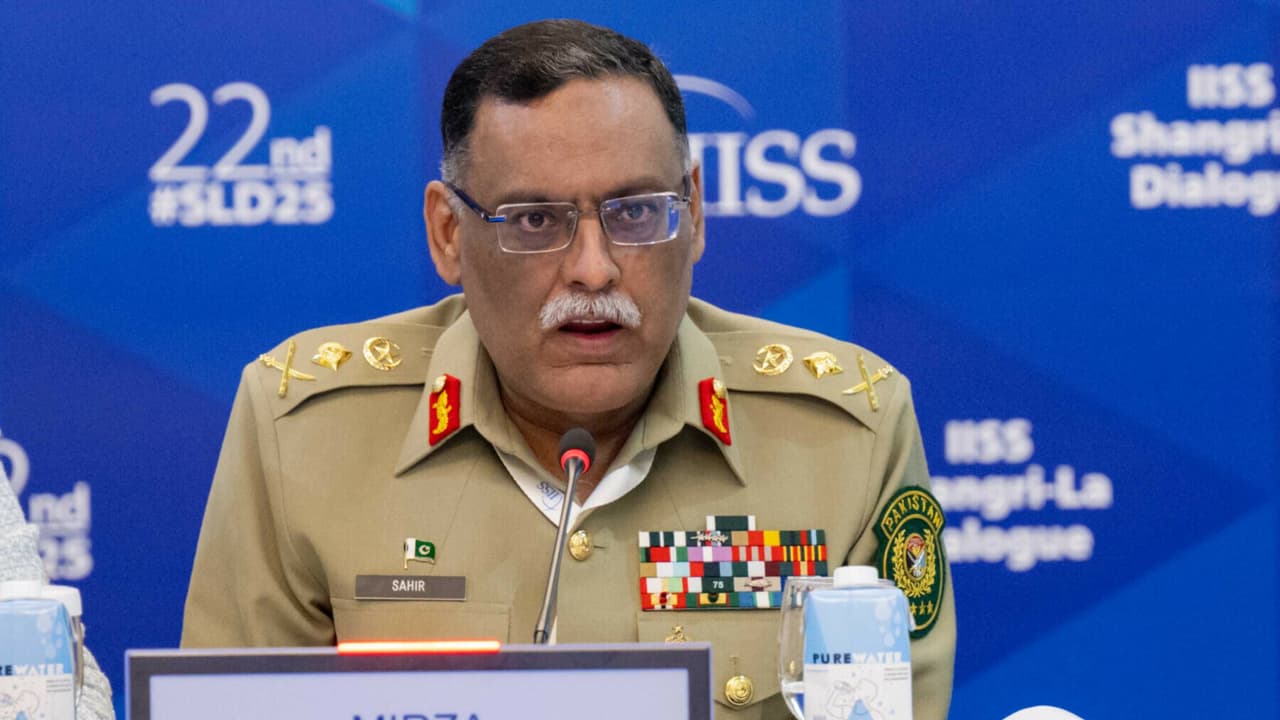Pakistan’s top military officer, General Sahir Shamshad Mirza, used the Shangri-La Dialogue platform in Singapore, to push Islamabad’s long-standing narrative on Kashmir, while issuing warnings of a potential full-scale war.
In a striking display of deflection and double standards, Pakistan’s top military official General Sahir Shamshad Mirza used a global security forum to target India over the recent military confrontation, conveniently overlooking Islamabad's own role in exporting terror. Speaking at the Shangri-La Dialogue in Singapore, Asia’s leading defence summit, the Chairman of Pakistan’s Joint Chiefs of Staff Committee (CJCSC) accused India of regional belligerence and blamed the absence of ‘conflict resolution’ mechanisms for bringing the two nuclear neighbours to the brink. He also warned that its absence could result in a ‘destructive escalation’.

India, which launched Operation Sindoor on May 7 in retaliation to the brutal April 22 Pahalgam terror attack that killed 26 civilians, has maintained that all its actions were precise, targeted, and strictly against terror infrastructure operating from Pakistani and PoK territory.
Pakistan’s General Pushes for ‘Conflict Resolution’ After Backing Terror Ecosystem
In remarks widely seen as both ironic and hypocritical, Gen Mirza claimed, “It has become imperative to move beyond conflict management towards conflict resolution. This will ensure sustainable peace and assured crisis management.”
He further added, “An early resolution of Kashmir (issue) in line with the UN Security Council resolutions and as per the aspirations of the people is essential.”
However, General Mirza failed to mention that the April 22 terrorist strike in Pahalgam, which prompted India’s response, originated from Pakistan-based terror groups - despite Lashkar-e-Taiba's proxy The Resistance Front (TRF) claiming responsiblity for the attack.
The Pakistan military leadership, known for propping up cross-border terrorism as an instrument of state policy, is now cautioning the world about the risk of escalation — a situation of its own making. “Given the Indian policies... the absence of a crisis management mechanism may not give enough time to the global powers to intervene and affect cessation of hostilities," Gen Mirza said, suggesting that international actors like the US, UK, China, Turkiye, Saudi Arabia and the UAE acted as interlocutors during the latest confrontation.
Mirza Flags Kashmir In Singapore
Pakistan, which has historically used global forums to internationalise the Kashmir issue, is once again shifting blame rather than addressing the core issue — its support for terror groups operating from its soil.
“When there is no crisis, Kashmir is never discussed, and as we always say that it is the Kashmir dispute resolution in line with the aspirations of the people of Kashmir and in line with the UNSC resolutions that will address many issues. The core that resides between Pakistan and India is Kashmir,” he said.
“Crisis prevention is better than crisis fighting. Suppressed disputes, whether territorial or ideological, cannot be indefinitely managed," he added.
Hollow Peace Rhetoric, Water Threats Amplify Pakistan’s Desperation
While painting Pakistan as a champion of peace, Gen Mirza issued a not-so-subtle warning over India’s decision to suspend the Indus Waters Treaty. “The weaponisation of water by holding Indus Waters Treaty in abeyance is in total defiance of the international laws… it could be considered as an act of war.”
Following the Pahalgam attack, India suspended the Indus Waters Treaty as part of a series of punitive measures against Pakistan.
The treaty, signed in 1960 with the World Bank as a guarantor, regulates the distribution of the Indus River system's waters between India and Pakistan.
Pakistan Blames West For Backing India
Mirza also warned that the “threshold of an escalatory war has come dangerously low,” accusing the West of “emboldening India as a net security provider” — a comment seen by many as a reflection of Pakistan’s growing frustration over New Delhi’s rising global stature.
“The threshold of an escalatory war has come dangerously low, implying greater risk on both sides, not just in the disputed territory but all of India and all of Pakistan,” he said.
“Emboldening of India as a net security provider by the West and its ambition to become a regional hegemon is disincentivising it to engage in conflict management options,” Gen Mirza added.
“Pakistan desired a peaceful coexistence with India based on mutual respect, sovereign equality and most importantly, dignity and honour. We seek a principal order, an order anchored in sovereign equality and restraint. In this, crisis management is not merely a set of tools but a strategic ethic,” he further said.
Gen Mirza also pointed out that the 1965 and 1971 wars with India were “always confined to the disputed territory”. “[However,] this time, it has transcended that and come to the international border.”
“Instead of targeting the borders first, which used to be the conventional domain or erstwhile domain, the cities have been targeted and the borders have relatively remained, if not silent, comfortable,” he said.
In what appeared to be an attempt to pre-empt criticism of Pakistan’s reckless posture, Mirza tried to frame the escalation as a consequence of unresolved disputes.
“The lowering of this threshold to the dangerous levels, if next time such a conflict occurs and the cities are targeted first, […] there could be a chance — I’m not trying to create an alarm but I’m speaking based on logic — there could be a possibility that before the international community intervenes because of the restricted or constricted times window, the damage and destruction may have already taken place," he said.
General Mirza’s comments at the Shangri-La Dialogue were a masterclass in strategic gaslighting. While the world watched Pakistan’s terror export push the region to the brink, it was India that acted with maturity, precision, and restraint. New Delhi’s proactive defence posture and global credibility as a responsible power have left Islamabad with little choice but to plead for mechanisms it has long sabotaged.


